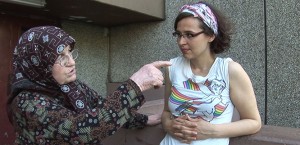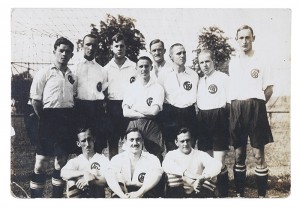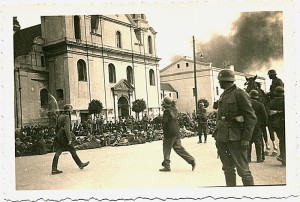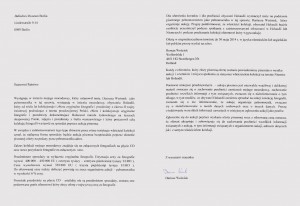
Canan Turan with her grandmother
© Adriana Uribe
In our series of events “New German Stories” we present different perspectives on the immigration country Germany. That immigrants from Turkey, Vietnam, Poland, India and Cameroon and their descendants have stories to tell is nothing new—the novel twist is, that they present them here as German stories. On Tuesday, 8 July, director Canan Turan will be a guest of the Academy of the Jewish Museum. In her film KIYMET, she tells the story of her grandmother, who migrated to Berlin from Turkey in the early 70s. We asked Canan three questions about her project:
How did the idea to make a film about your grandmother Kıymet come about? → continue reading
Gems from our Collection

Harry Engel (1892-1950) with the FC Bayern Munich, Munich, September 1916
© Jewish Museum Berlin, donated by Alfred Engel, photo: Jens Ziehe
On 15 February 1940, after a four-year wait for an American visa then a successful escape from Nazi Germany, the Engel family, hitherto of Munich, reached the safe shores of Manhattan. In the family’s luggage was memorabilia that the then 13-year-old Alfred Engel was to donate to the Jewish Museum Berlin, decades later, from his father’s estate. It includes rare photographs from the 1910s, a time when Harry Engel (1892–1950) was an active soccer player at FC Bayern Munich. → continue reading

Photograph from World War II. The sellers priced it at 3000 euros.
The financial crisis of 2007 had an impact both on the countries of Western and Eastern Europe. The złoty may still glitter but it has long since ceased to be the “golden coin” Polish currency was originally named for. Unemployment and stagnant economic growth, rising real estate prices and declining purchasing power have put the brake on Poland’s economic recovery. The Netherlands has likewise been in recession for years. Declining competitiveness, private debts, state-subsidized home ownership, the low retirement age and the expensive health care system have fed uncertainty and repeatedly paved the path to success for the Freedom Party of the populist xenophobe Geert Wilders.

The Polish letter of offer as we received it.
This downward spiral in state treasury and personal funds led a couple of Polish resp. Dutch wheeler-dealers to scrape the barrel for a bilateral business model. Crafty Dariusz Woźniok and his fly-by-night Dutch client somehow managed to get their hands on infantrymen’s photos from the Second World War—whether as thieves or buyers it is impossible to say. Maybe they were embittered by the fact that no share in the tidy profits made from material goods ever came their way, from the export of Polish geese, strawberries, potatoes and beetroot, for example, or of Dutch cheese and tulips. Maybe they hatched their business plan in an Amsterdam coffee shop and had simply smoked one hash pipe too many. Whatever the case, they figured: “It was a sure bet that snapshots of ghettos and so-called ‘Jewish actions’ in early 1940s Poland could be sold off as ‘Holocaust-ware’ to Jewish Museums—so why not make the most of an historic windfall?” → continue reading



